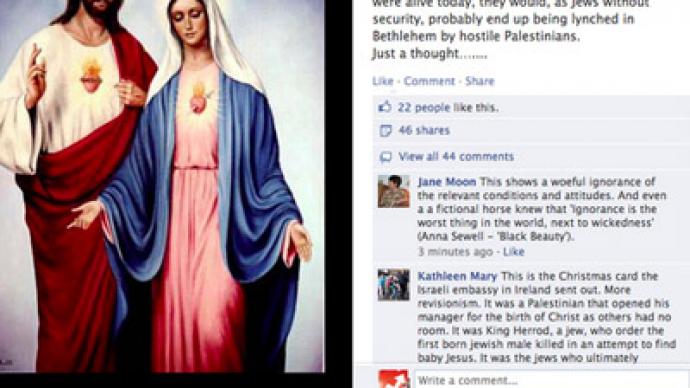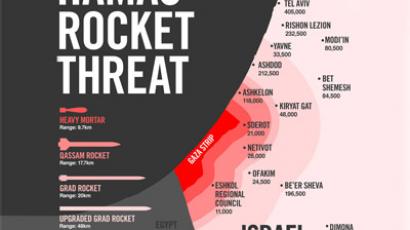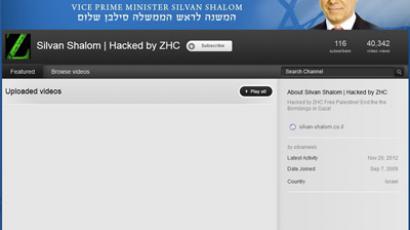Israeli Embassy: ‘If alive today, Jesus and Mary would be lynched by hostile Palestinians’

Israel’s diplomatic corps finds itself in hot water after posting an inflammatory message on an official Facebook page. Although the message has now been deleted, this is not the first time Israel has used social media to post controversial views.
The message appeared on the IsraelinIreland Facebook page – which is linked to on the official embassy site – on Monday morning. The post comprised a painting of Mary and Jesus, accompanied by the following caption:"A thought for Christmas… If Jesus and mother Mary were alive today, they would, as Jews without security, probably end up being lynched in Bethlehem by hostile Palestinians. Just a thought…"The message sparked immediate heated debate, but was taken down within hours.“An image of Jesus and Mary with a derogatory comment about Palestinians was posted without the consent of the administrator of the Facebook page. We have removed the post in question immediately. Apologies to anyone who may have been offended,” said an official statement from the Israeli embassy in Dublin.
Since then, the IsraelinIreland page has been shut down altogether, and the link on the official website has been removed.This was not the first time the account, which is updated by unnamed embassy staff, broadcast strong opinions.It previously claimed that Palestinian children “play how to launch a missile in order to hit innocent Israeli children, woman and men! The apple does not fall far from the tree!” and that “Pro Palestinianism is often just a politically correct cover for anti-Semitism.”Although a popular tourist destination for Israelis, Ireland has a tempestuous relationship with Israel. The Israeli mission, which is headed by Boaz Mozai, who is deputized by his wife, Nurit Tinari Modai, has captured the headlines with its confrontational approach.Last year Tinari Modai claimed in a letter that Ireland-based Jews should have their private information made public if they criticize their homeland.Yet the post doesn’t appear to be an isolated incident and appears as an example of Israel's wider policy of hasbara (which loosely translates as “explanation”). Hasbara is seen as a concerted effort to forcefully promote Israeli views in the face of what Jerusalem perceives to be predominantly anti-Israeli media coverage worldwide. Although the term appeared in the 1970s, the policy has gained new impetus with the ascent of social media.Within the semi-official policy, Israeli embassies have turned from bland conduits of diplomatic formalities, to headline-grabbing broadcast stations. For example, ahead of the recent vote on the status of Palestine in the UN, the Israeli embassy in Washington posted a cartoonish video showing Palestinian President Mahmoud Abbas driving a bus full of radicals. At the end of the video Abbas was faced with a fork in the road, with UN membership leading to a war zone, and the alternative to an idyllic land of peace. The video was widely lambasted as disrespectful in the media.
Meanwhile, the recent conflict with Hamas, showed the two sides releasing dueling statements about war movements, losses and plans on their respective Twitter feeds, sometimes even lobbing insults at each other.Now, a line appears to have been drawn. In the aftermath of the latest social media imbroglio Israeli Foreign Ministry spokesman Yigal Palmor, who lamented that Facebook is a “very informal channel, which is essentially not diplomatic”, promised that in future instances if “anyone is hurt” by official statements, Israeli staff will remove posts and apologize promptly.














